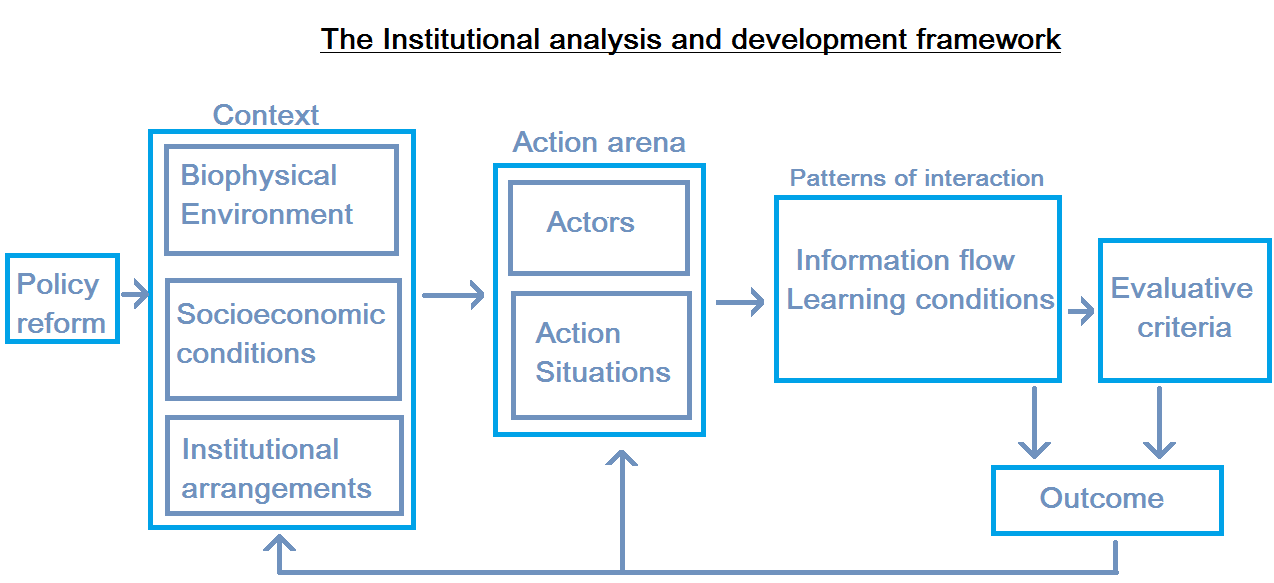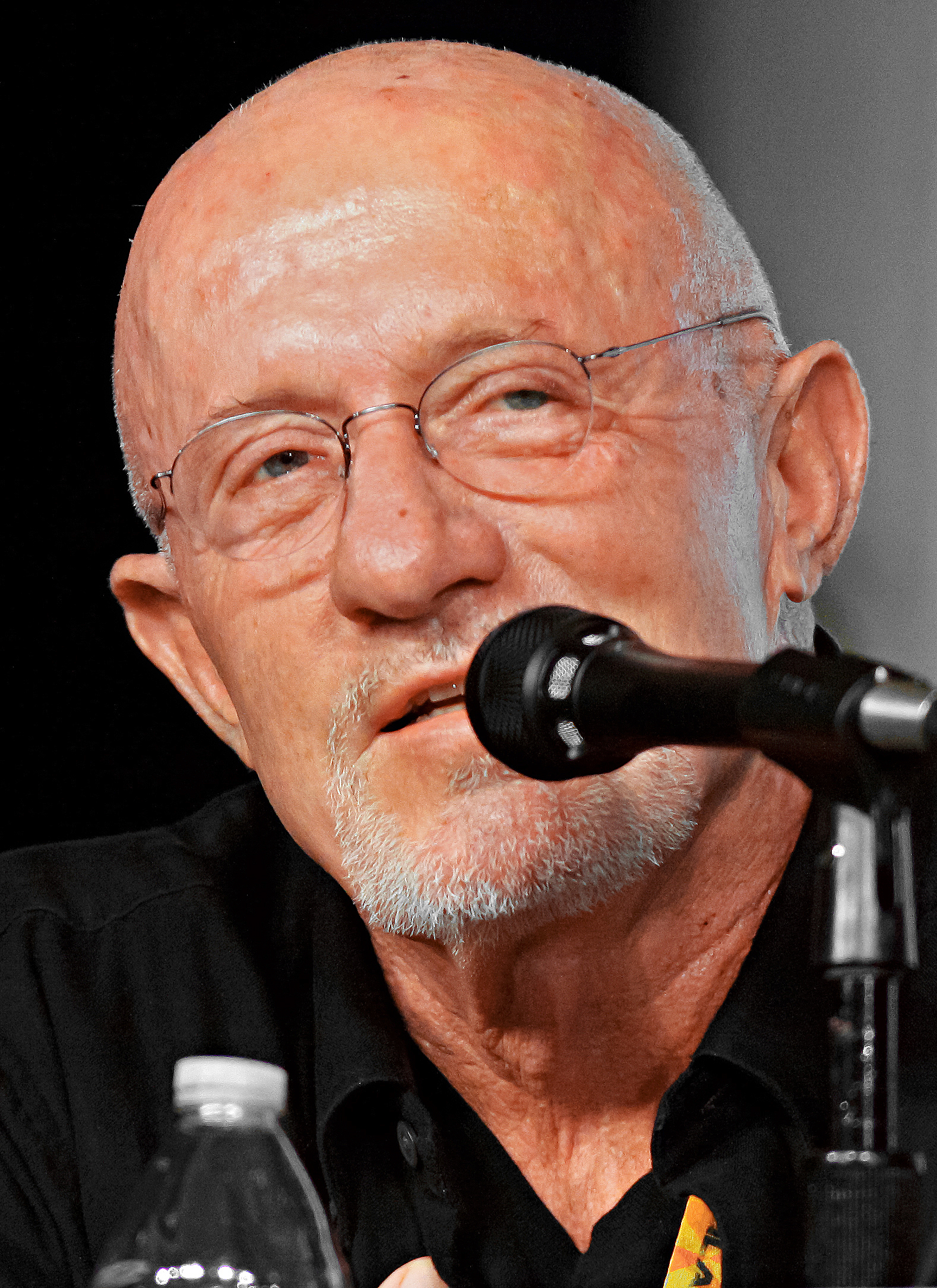|
Institutional Analysis And Development Framework
The Institutional Analysis and Development framework (IAD) is a theoretical framework for investigating how people ("actors") interact with common-pool resources (CPRs). CPRs are economic goods which are rivalrous (i.e. one person's use reduces the ability of others to use) and non-excludable (i.e. it's impractical to prevent people accessing it) - examples include forests as a source of timber, or fields as a source of pasture. It was developed by Elinor Ostrom, an American political scientist and the first woman to receive the Nobel Memorial Prize in Economic Sciences in 2009. Ostrom researched which institutional structures supported CPR actors to sustainably use their resources, balancing individuals' use with the interest of a wider public. Under rational choice assumptions, the IAD was devised in an attempt to ''explain and predict'' outcomes by formally exploring and documenting governance structures, actors' positions, and informal and formal rules. Thus, the IAD is a syste ... [...More Info...] [...Related Items...] OR: [Wikipedia] [Google] [Baidu] |
Common-pool Resource
In economics, a common-pool resource (CPR) is a type of good consisting of a natural or human-made resource system (e.g. an irrigation system or fishing grounds), whose size or characteristics makes it costly, but not impossible, to exclude potential beneficiaries from obtaining benefits from its use. Unlike pure public goods, common pool resources face problems of congestion or overuse, because they are subtractable. A common-pool resource typically consists of a core resource (e.g., water or fish), which defines the ''stock variable'', while providing a limited quantity of extractable fringe units, which defines the ''flow variable''. While the core resource is to be protected or nurtured in order to allow for its continuous exploitation, the fringe units can be harvested or consumed. Examples of a Common-Pool Resource Common-pool goods are typically regulated and nurtured in order to prevent demand from overwhelming supply and allow for their continued exploitation. Examples o ... [...More Info...] [...Related Items...] OR: [Wikipedia] [Google] [Baidu] |
Elinor Ostrom
Elinor Claire "Lin" Ostrom (née Awan; August 7, 1933 – June 12, 2012) was an American Political science, political scientist and Political economy, political economist whose work was associated with New institutional economics, New Institutional Economics and the resurgence of political economy. In 2009, she was awarded the Nobel Memorial Prize in Economic Sciences for her "analysis of economic governance, especially the commons", which she shared with Oliver E. Williamson; she was List of Nobel Memorial Prize laureates in Economics, the first woman to win the prize. Trained in political science at UCLA, Ostrom was a faculty member at Indiana University Bloomington for 47 years. Beginning in the 1960s, Ostrom was involved in resource management policy and created a research center, the Bloomington school, Workshop in Political Theory and Policy Analysis, which attracted scientists from different disciplines from around the world. Working and teaching at her center was created o ... [...More Info...] [...Related Items...] OR: [Wikipedia] [Google] [Baidu] |
Political Scientist
Political science is the scientific study of politics. It is a social science dealing with systems of governance and Power (social and political), power, and the analysis of political activities, political philosophy, political thought, political behavior, and associated constitutions and laws. Specialists in the field are political scientists. History Origin Political science is a social science dealing with systems of governance and power, and the analysis of political activities, political institutions, political thought and behavior, and associated constitutions and laws. As a social science, contemporary political science started to take shape in the latter half of the 19th century and began to separate itself from political philosophy and history. Into the late 19th century, it was still uncommon for political science to be considered a distinct field from history. The term "political science" was not always distinguished from political philosophy, and the modern dis ... [...More Info...] [...Related Items...] OR: [Wikipedia] [Google] [Baidu] |
Nobel Memorial Prize In Economic Sciences
The Nobel Memorial Prize in Economic Sciences, officially the Sveriges Riksbank Prize in Economic Sciences in Memory of Alfred Nobel (), commonly referred to as the Nobel Prize in Economics(), is an award in the field of economic sciences administered by the Nobel Foundation, established in 1968 by Sveriges Riksbank (Sweden's central bank) to celebrate its 300th anniversary and in memory of Alfred Nobel. Although the Prize in Economic Sciences was not one of the original five Nobel Prizes established by Alfred Nobel's will, it is considered a member of the Nobel Prize system, and is administered and referred to along with the Nobel Prizes by the Nobel Foundation. Winners of the Prize in Economic Sciences are chosen in a similar manner to and announced alongside the Nobel Prize recipients, and receive the Prize in Economic Sciences at the Nobel Prize Award Ceremony. The laureates of the Prize in Economic Sciences are selected by the Royal Swedish Academy of Sciences, which ... [...More Info...] [...Related Items...] OR: [Wikipedia] [Google] [Baidu] |
Rational Choice Theory
Rational choice modeling refers to the use of decision theory (the theory of rational choice) as a set of guidelines to help understand economic and social behavior. The theory tries to approximate, predict, or mathematically model human behavior by analyzing the behavior of a rational actor facing the same costs and benefits.Gary Browning, Abigail Halcli, Frank Webster (2000). ''Understanding Contemporary Society: Theories of the Present'', London: Sage Publications. Rational choice models are most closely associated with economics, where mathematical analysis of behavior is standard. However, they are widely used throughout the social sciences, and are commonly applied to cognitive science, criminology, political science, and sociology. Overview The basic premise of rational choice theory is that the decisions made by individual actors will collectively produce aggregate social behaviour. The theory also assumes that individuals have preferences out of available choice ... [...More Info...] [...Related Items...] OR: [Wikipedia] [Google] [Baidu] |
Systematic Sampling
In survey methodology, one-dimensional systematic sampling is a statistical method involving the selection of elements from an ordered sampling frame. The most common form of systematic sampling is an equiprobability method. This applies in particular when the sampled units are individuals, households or corporations. When a geographic area is sampled for a spatial analysis, bi-dimensional systematic sampling on an area sampling frame can be applied. In one-dimensional systematic sampling, progression through the list is treated circularly, with a return to the top once the list ends. The sampling starts by selecting an element from the list at random and then every ''k''th element in the frame is selected, where ''k'', is the sampling interval (sometimes known as the ''skip''): this is calculated as: :k = \frac Nn where ''n'' is the sample size, and ''N'' is the population size. Using this procedure each element in the population has a known and equal probability of selectio ... [...More Info...] [...Related Items...] OR: [Wikipedia] [Google] [Baidu] |
Analytical Technique
Analytic or analytical may refer to: Chemistry * Analytical chemistry, the analysis of material samples to learn their chemical composition and structure * Analytical technique, a method that is used to determine the concentration of a chemical compound or chemical element * Analytical concentration Mathematics * Abstract analytic number theory, the application of ideas and techniques from analytic number theory to other mathematical fields * Analytic combinatorics, a branch of combinatorics that describes combinatorial classes using generating functions * Analytic element method, a numerical method used to solve partial differential equations * Analytic expression or analytic solution, a mathematical expression using well-known operations that lend themselves readily to calculation * Analytic geometry, the study of geometry based on numerical coordinates rather than axioms * Analytic number theory, a branch of number theory that uses methods from mathematical analysis Mat ... [...More Info...] [...Related Items...] OR: [Wikipedia] [Google] [Baidu] |
Physical Science
Physical science is a branch of natural science that studies non-living systems, in contrast to life science. It in turn has many branches, each referred to as a "physical science", together is called the "physical sciences". Definition Physical science can be described as all of the following: * A branch of science (a systematic enterprise that builds and organizes knowledge in the form of testable explanations and predictions about the universe)."... modern science is a discovery as well as an invention. It was a discovery that nature generally acts regularly enough to be described by laws and even by mathematics; and required invention to devise the techniques, abstractions, apparatus, and organization for exhibiting the regularities and securing their law-like descriptions." —p.vii, J. L. Heilbron, (2003, editor-in-chief). ''The Oxford Companion to the History of Modern Science''. New York: Oxford University Press. . * A branch of natural science – nat ... [...More Info...] [...Related Items...] OR: [Wikipedia] [Google] [Baidu] |
Social Science
Social science (often rendered in the plural as the social sciences) is one of the branches of science, devoted to the study of societies and the relationships among members within those societies. The term was formerly used to refer to the field of sociology, the original "science of society", established in the 18th century. It now encompasses a wide array of additional academic disciplines, including anthropology, archaeology, economics, geography, history, linguistics, management, communication studies, psychology, culturology, and political science. The majority of positivist social scientists use methods resembling those used in the natural sciences as tools for understanding societies, and so define science in its stricter modern sense. Speculative social scientists, otherwise known as interpretivist scientists, by contrast, may use social critique or symbolic interpretation rather than constructing empirically falsifiable theories, and thus treat science in its ... [...More Info...] [...Related Items...] OR: [Wikipedia] [Google] [Baidu] |
Indiana University
Indiana University (IU) is a state university system, system of Public university, public universities in the U.S. state of Indiana. The system has two core campuses, five regional campuses, and two regional centers under the administration of IU Indianapolis. The flagship campus of Indiana University is Indiana University Bloomington. Campuses Core campuses *Indiana University Bloomington (IU Bloomington) is the flagship campus of Indiana University. The Bloomington campus is home to numerous premier Indiana University schools, including the College of Arts and Sciences, the Hutton Honors College, the Jacobs School of Music, an extension of the Indiana University School of Medicine, the Indiana University School of Informatics, Luddy School of Informatics, Computing, and Engineering, which includes the former School of Library and Information Science (now Department of Library and Information Science), School of Optometry, the Indiana University School of Public and Enviro ... [...More Info...] [...Related Items...] OR: [Wikipedia] [Google] [Baidu] |
Social Institutions
An institution is a humanly devised structure of rules and norms that shape and constrain social behavior. All definitions of institutions generally entail that there is a level of persistence and continuity. Laws, rules, social conventions and norms are all examples of institutions. Institutions vary in their level of formality and informality. Institutions are a principal object of study in social sciences such as political science, anthropology, economics, and sociology (the latter described by Émile Durkheim as the "science of institutions, their genesis and their functioning"). Primary or meta-institutions are institutions such as the family or money that are broad enough to encompass sets of related institutions. Institutions are also a central concern for law, the formal mechanism for political rule-making and enforcement. Historians study and document the founding, growth, decay and development of institutions as part of political, economic and cultural history. Definit ... [...More Info...] [...Related Items...] OR: [Wikipedia] [Google] [Baidu] |




